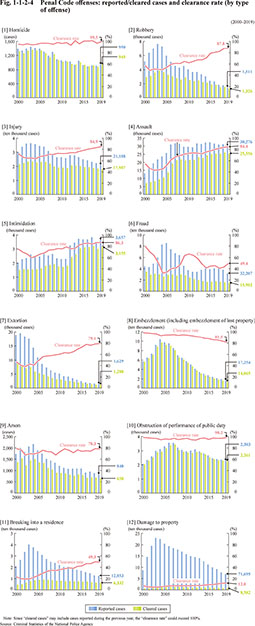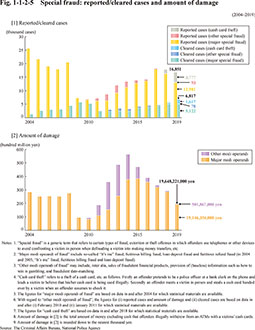3 Other Penal Code offenses
Fig. 1-1-2-4 shows the trend in the number of reported/cleared cases and the clearance rate for other major Penal Code offenses.
Fig. 1-1-2-4 Penal Code offenses: reported/cleared cases and clearance rate (by type of offense)
Fig. 1-1-2-5 shows the trend in reported/cleared cases of so-called “special fraud”, and the amounts of damage caused. Special fraud is a generic term that refers to certain types of fraud or extortion offenses in which offenders use telephones or other devices to avoid confronting victims in person and subsequently defraud victims into making money transfers and the like to profit offenders. Among various schemes used in special fraud, those counted as major modi operandi include so-called “It’s me” fraud (an offender pretends to be a child or someone close to a victim in need of urgent monetary assistance), fictitious billing fraud, loan deposit fraud (an offender fraudulently informs a victim that an advance deposit is required to obtain a loan) or fictitious refund fraud (an offender pretends to be a public official who will assist a victim to receive a tax refund or other type of repayment) (in 2004 and 2005, “It’s me” fraud, fictitious billing fraud and loan deposit fraud only). Schemes of other modi operandi may include sales of fraudulent financial products, provision of (baseless) information such as how to win in gambling or fraudulent date-matching. In addition, there is a special fraud scheme known as “bank card fraud” which is as follows; firstly, an offender pretends to be a policeman and telephones a victim, stating “Your bank card is being used illegally by others. I will visit your house and check your bank card, so please prepare your bank card in advance.” Secondly, the offender visits the victim’s residence and starts to pretend to check the bank card. Finally, while the victim momentarily takes his/her eyes off the bank card, the offender steals it.
Fig. 1-1-2-5 Special fraud: reported/cleared cases and amount of damage

